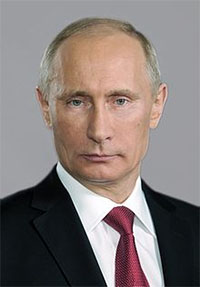Putin’s remarks continue to fan controversy over anti-LGBT law
President Obama and Russian President Vladimir Putin spoke by phone Tuesday on a number of issues facing both nations, including the threats being made on the upcoming Olympic Games in Sochi. But they didn’t talk about — at least not according to a White House read-out of the conversation — was Putin’s recent caustic remarks concerning gay people coming to Russia for the Olympics. On Friday, it was widely reported that Putin said gays visiting Russia for the Olympics can feel at ease as long as they “leave children in peace, please.”
The remark, and its underlying insinuation that gay people harm children, was not included in Putin’s published remarks on his official website but was reported by media attending his speech to the volunteers in Sochi for the Olympic Games.
Just one day before and one day after those remarks, Putin promised there would be no discrimination against athletes or visitors.
“The Games will be held in complete compliance with the Olympic Charter, without any discrimination on the basis of any characteristic,” said Putin in an address welcoming foreign ambassadors to Moscow on January 16.
And in a group interview with reporters, Putin assured ABC news anchor George Stephanopoulos “none of our guests will have any problems,” and reminded him about Olympic protests in 1968 by black Americans.
The latter comment came in response to Stephanopoulos pressing Putin on how he would respond “if gay or lesbian athletes engage in some sort of protest, wear a rainbow pin or some other kind of protest, will they be free from prosecution under the propaganda laws?”
According to ABC’s transcript of the interview, Putin said, “Acts of protest and acts of propaganda are somewhat different things.”
“So if they wear a rainbow pin or kiss their partner…” asked Stephanopoulos.
“They are close, but if we were to look at them from the legal perspective,” said Putin, “then protesting a law does not amount to propaganda of homosexuality or sexual abuse of children. That’s one. Two is that I’d like to ask our colleagues, my colleagues and friends that, as they try to criticize us they would do well to set their own house in order first. I did say, after all, and this is public knowledge that in some of the states in the U.S. homosexuality remains a crime.”
Stephanopoulos corrected him, noting that the Supreme Court struck down “those laws.”
But Putin replied that the U.S. was not “in a position to criticize us” given that “there are a lot of folks in the U.S. who share the view that the legislation in their state or in their nation is appropriate, well-grounded and is in sync with the sentiment of the vast majority of the population.”
“This needs to be discussed together at some, some more acceptable forum. Shared approaches need to be devised. We hear you,” said Putin. “My response to you is none of our guests will have any problems. We remember certain dark-skinned citizens of the U.S., during Olympics, major international competitions, protest against segregation. I saw it with my own eyes on TV screens. Well, this is a practice that people use to make a statement about their rights.”
Putin said he had no reaction to President Obama’s including three openly gay members in the U.S. delegation to the Sochi Games’ opening and closing ceremonies.
He also downplayed any worry last week about reports that 30 percent of tickets are still unsold to the Games, just three weeks out from the February 7 opening ceremony. The Russian channel R-Sport, a division of Russia’s leading news agency, reported Friday that Putin he would fill the empty seats with volunteers, if necessary.
At the 2010 Winter Olympics in Vancouver, only three percent of tickets went unsold by the end of the Games, according to the Vancouver Olympic Committee’s Marketing Report.
In addition to the prominent controversy around Russia’s new laws hostile to LGBT people, Russia has been hit with three terrorist attacks in the past month and new threats this week. The website of a Chechen group posted a videotaped threat against the Games on Sunday, promising “revenge” for “all the Muslim blood that is shed every day around the world, be it in Afghanistan, Somalia, Syria, all around the world.”



Um so has anyone thought about not boycotting?
The majority of Russians poll in favour of anti-gay legislation (86%) – and while it’s easy to boycott Russian vodka in American bars, moralise in a kooky chat show or reject invitations to attend the Opening, it’s important to take into account the views of LGBT activists in Russia (who, in most cases, don’t support a boycott).
Putin wasn’t implying gays are pedophiles. He was merely commenting on the law which doesn’t allow telling kids someone’s gay. I’ve read gays are into children sexually, & I’m inclined to believe it, by the number of gays that assumed Putin was talking about pedophilia.